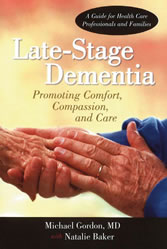About Michael Gordon, MD, MSc, FRCPC, FACP, FRCPEdin
Michael Gordon, MD, MSc, FRCPC, FACP, FRCPEdin Medical Program Director Palliative Care, Baycrest Geriatric Health Care System Professor of Medicine, University of Toronto He is one of Canada’s best known geriatric medical specialists. His latest book, Parenting your Parents’ third edition follows soon on his book Late-Stage Dementia: Promoting Comfort, Compassion and Care. This followed his book Moments that Matter: Cases in Ethical Eldercare followed soon after the publication of his memoir Brooklyn Beginnings: A Geriatrician’s Odyssey. Each of these books is felt to fulfill a special need that family members share in their pursuit of providing the best of care for their aging loved ones. Most health care professionals should also find the books of assistance to them in the care they provide and in their ability to communicate effectively with family members and those responsible for decision making. Brooklyn Beginnings was an exciting departure from his books devoted to the challenges of care-giving. The reflections recounted in Brooklyn Beginnings trace Dr. Gordon’s roots and the circuitous path he has taken to reach his position in Canada as a regular contributor and commentator on the joys and problems of the elderly for various TV programs, radio shows, newspapers and magazines. Dr. Gordon publishes for the professional press in the United States and Canada and is frequently interviewed and quoted in the media on issues related to aging.
He is currently Professor of Medicine in the Division of Geriatrics at the University of Toronto, Medical Program Director of Palliative Care, and Former Vice President of Medical Services and Head of Geriatrics and Internal Medicine, at Toronto’s Baycrest Health Sciences. Dr. Gordon holds Canada’s first certificate issued by the Royal College of Physicians and Surgeons in the field of Geriatric Medicine. He was awarded a fellowship in the Royal College of Physicians of Edinburgh in 2004. In addition to his contributions to the field of geriatric medicine, Dr. Gordon has written and spoken widely on the field of medical ethics, especially in relation to the elderly and to end-of-life situations. He is a member of the University of Toronto’s Joint Centre for Bioethics and in this capacity is involved in ethics education primarily for health care providers. He writes on ethics for medical publications, with articles on medical ethics that appeared in the Annals of Long-Term Care where he was recently appointed to the editorial board. He was recently appointed as Editor-in-Chief, Dementia Resource, www.healthplexus.net and Journal of Current Clinical Care. During his years at the University of Toronto he has taught medical students and post-graduate medical trainees. He has served on many national, provincial and health organization’s committees and boards including the Canadian National Advisory Council on Aging, the Ontario Drug Benefit Program’s Quality and Therapeutics Committee. He continues to serve on the College of Physicians of Ontario. He has contributed to many corporations as they develop programs for the care of the elderly, including most recently Pfizer’s More than Medication program.
Dr. Gordon is a well respected and much sought after speaker to both general audiences and health care professional. As an engaging and charismatic speaker, he shares with listeners his thought on the following topics:
Ethical Issues in Geriatrics and Long-term Care. The focus is on the challenges faced by health care professionals and families of frail elders that encompass the clinical and ethical domains of practice, such as those related to artificial nutrition and hydration, aspects of medical care, resuscitation, and symptom management at the end-of-life.
End-of-life Dementia Care. The emphasis is on the special challenges that occur in those with the various stages of cognitive impairment, and how health care providers and family members struggle with making the decisions that will provide a balance between respect, dignity and comfort, as those with dementia reach the latter stages of their life.
An Overview of the History of Aging. This presentation, often used as an introduction to a conference on aging, uses art, literature and historical references to bring the audience to appreciate the long and illustrious history of care for the aging throughout the world.
Caring for Your Aging Parent. Directed to children of aging parents and other loved ones this presentation reflects the content of the book Parenting Your Parents. Its focus is first to recognize and address the process of frailty in one’s loved one, and then taking the necessary steps for the caregiver to assure their ability to continue with this most challenging task
Visit Website
 We wish to thank Dr. Gordon for taking time from his very busy schedule to share his perspective on some of the end-of-life issues that families often face. During our podcast he explains:
We wish to thank Dr. Gordon for taking time from his very busy schedule to share his perspective on some of the end-of-life issues that families often face. During our podcast he explains:

























Hello, I have a sister who is abusing (FINANCIALLY) my Dads money. She has SDM, his wife just passed and I now have hers and my Dads wills .In the will the POA is someone else who is willing to sign over to me if possible . Can this be done and will it cancel out my sisters. She did this while dad was in care as he has dementia.
I know how frustrating and helpless you must feel. To really get a handle on this issue, I suggest you meet with a lawyer to discuss your concerns and options.